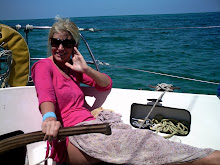
Our second day out of Clarence Town dawned still and hot. Pete came up on deck for the sunrise and I gratefully turned the boat over to him, stumbled below to my bunk and fell fast asleep to the rhythmic rumble of the diesel motor. Two hours later I was up again. The sun had turned the cabin into an oven and it was too hot to bear, even after only three hours of sleep the night before.
Unalleviated by sea breeze, the heat of the southern sun beat down with physical force. I felt its weight pinning me to the bench. The dark deck boards became so hot they burned the bottoms of my feet and Pete and I had to dump buckets of sea water over the cockpit in order to stay at the helm.
The heat and monotony was broken at eleven thirty when Pete spotted a faint speck broad on our port bow. "Land Ho!" The northeast coast of Cuba now created a tiny break in the straight line horizon. This was as excellent an excuse as any and Pete declared a swim break. We shut down the core, lashed down the tiller, trailed a safety line, and plopped over the rail into the slightly less hot water beside the boat. The sea was a spectacular, mesmerizing blue, crystal clear and incredibly deep. Rays of sun sparkled through the smooth surface, golden beams reaching down and down, fainter and slimmer until they were disappeared completely.
According to the charts, the ocean here was more than 1,400 fathoms deep, more than 8,400 feet, more than a mile and a half of water straight down. It was an eerie feeling knowing there was that much water, that much space beneath me. I swam with my snorkel mask on, glowing white hands and feet flashing briefly on the periphery of my vision, suspended at that intersection of sea and sky, a mile and a half above the earth. As I moved slowly away from the boat, my mind wandered. I wondered what leviathans, what monsters of the deep might be down there, lurking just out of sight in the depths below my toes. I peered fixedly through the water, staring at nothing, watching as the sun beams were swallowed up, and waiting for some smokey form to suddenly solidify out of the dark and come rushing up, mouth gaping, swift and silent.
At this point I pulled my head out of the water. Time to think about something else. I had now swum a fair distance from the boat and looked back. Pete was up on deck coiling a length of rope. The mainsail, which we'd left up, hung limply from the mast. Strolla bobbed softly in the low waves. From my vantage point in the water, the Cuban coastline was no longer in view. Water in every direction. I looked again at the boat and felt a sudden swell of affection for her, our little floating home, the only thing between me and a slow, lonely death. I swam back.
The only swim ladder we have is one Pete salvaged off a wreck on Block Island back in January and it doesn't seem to make climbing aboard any easier so we don't use it. Instead, we head for the chain plates, amidships, kicking up out of the water to grasp the shrouds, hooking a heal over the gunwale, and levering ourselves up and out and on deck from there. It takes a little practice.
Back in the sweltering sun we started up the motor and set off once more for Cuba dousing the deck periodically for the sake of our burning feet. Consulting the charts we realized that we would once again not be able to make port by dark and so decided to spend a second night at sea, turning west heading up the coast.





